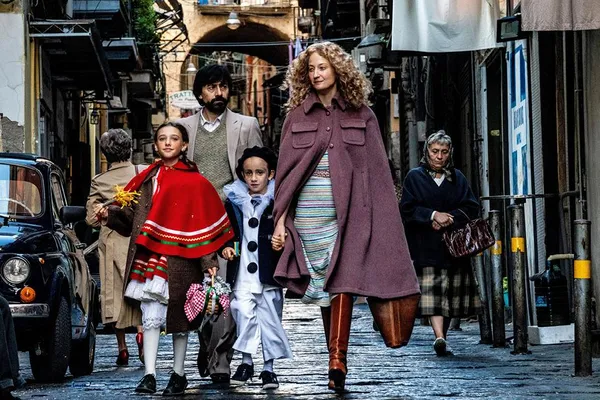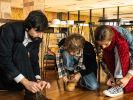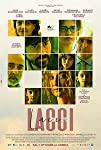Eye For Film >> Movies >> The Ties (2020) Film Review
The Ties
Reviewed by: Anne-Katrin Titze

Two of the highlights of the 2021 virtual edition of Open Roads: New Italian Cinema presented by Film at Lincoln Center and Istituto Luce Cinecittà are Salvatore Mereu’s adaptation of Giulio Angioni’s Assandira, starring Gavino Ledda (author of Padre Padrone, turned into a movie by Paolo Taviani and Vittorio Taviani) with Anna König, Marco Zucca, and Corrado Giannetti, and Daniele Luchetti’s The Ties (Lacci), adapted from the novel by Domenico Starnone, with co-screenwriter Francesco Piccolo, which stars Alba Rohrwacher and Luigi Lo Cascio with Laura Morante, Silvio Orlando, Giovanna Mezzogiorno and Adriano Giannini.
Starnone’s novel begins with Vanda’s letters to her husband Aldo. She writes about how she feels and how she sees what he is doing to their family, which includes two small children, Sandro and Anna. “You want to isolate me, cut me out completely. And what matters most, you want to avoid every attempt to re-examine our relationship.” This refusal of a man to take responsibility for how his actions and non-actions cause havoc to those around him is at the core of Luchetti’s conscientious and poignant family portrait. Even more than in the book, we are shown a man who uses passivity as his weapon of choice.

The film begins with a closeup of shoes. Dancing feet - lacci also means laces - hop in a carnivalesque conga line. Children are having fun in their costumes, while Vanda (Alba Rohrwacher) and Aldo (Luigi Lo Cascio) cannot hide on their faces all the bad blood and the doom that is to come. We are in Naples in the early Eighties and the family is about to blow up. 6-year-old Sandro (Joshua Francesco Louis Cerciello) and 8-year-old Anna (Giulia De Luca) are sitting on the couch with their parents, watching a nature documentary about lions and their family ties. Aldo aids the kids with their bath and tells them a good-night story about a road paved with chocolate. Later that night, he tells his wife that “something happened.” Aldo, who works in Rome where he is the host of a literary radio program, has been with another woman.
Alba Rohrwacher is a master of slow-burn decision making, her facial expressions and body movements letting us participate in the ever so slight shifts of shock. Luigi Lo Cascio is truly a revelation, shining a light into all the corners of weakness of a man so commonplace in life and so unseen in cinema. The Aldos of the world, men so insecure that only cruelty gets them results, have been neglected in movies for far too long. Some of the roles of Jean-Pierre Bacri in Agnès Jaoui films came to mind, and maybe Lo Cascio’s own role in Paolo Virzi’s Human Capital, where he is the utterly ineffective professor who attempts to seduce Valeria Bruni Tedeschi’s mogul wife. The utter lack of charm makes the portrayal so bold.
With the ties in a messy tangle, Aldo, who moved out, visits less and less frequently. The details of his callousness are drawn in stark relief. The precision of the stabs to the heart take your breath away. When little Anna shows her father a drawing she made, that she describes as a depiction of her dream in which she died, he comments on the “nice colours.” He gives his son a toy he clearly doesn’t like and his daughter a necklace with a pendant, obviously chosen by his new lover Lidia (Linda Caridi). Hurt is in the details, the careless gifts, the slights. When the children visit him in Rome, he drops them off with friends and stays with his girlfriend he gets more and more obsessed with.
It doesn’t occur to him that a radio program he hosts about F. Scott Fitzgerald’s last finished novel, Tender is the Night, has anything to do with him. Blaming the times, blaming everyone else are his modi operandi. “You consider us an irrational, malign residue,” Vanda calls it in the novel. Her suffering is like a spectacle for him. Rarely has a film cut so close to the bone of what family means.
With the film’s strong emphasis on the power of language, you shouldn’t overlook the excellent production design by Andrea Castorina and fluid cinematography by Ivan Casalgrandi. The costume designer, Massimo Cantini Parrini, an expert on fairy-tale movies, from Terry Gilliam’s The Brothers Grimm, to Matteo Garrone’s Tale Of Tales, to his recently Oscar-nominated work on Garrone’s Pinocchio, makes magnificent choices, especially for Rohrwacher’s Vanda. On the sartorial verge between the Seventies and Eighties, her tall boots, expressive belts, and dresses that could have been taken from a doll, the clothes speak of her individuality as well as the desire to do the right thing. “It’s not easy to suffer in a nice way,” comments Aldo to his friends in a rare moment of defence of the wife he discarded.
As The Ties is structured in three parts, covering decades, we do get to meet an older Aldo (Silvio Orlando) and Vanda (Laura Morante) who are going on vacation, older children (Sveva Esposito and Giovannino Esposito) and the children as adults (Giovanna Mezzogiorno and Adriano Giannini) plus the all-important cat, Labes, whose name is as much a puzzle as are his whereabouts.
There is a miraculous playfulness to all this destructive behaviour. When one riddle is solved, another one appears. Objects, say a dictionary or a magical box of memory, function as manifestations of sensitivities and can show up empty. Are we watching a manual of how to demolish another person and get away with it? No, because cowardliness comes with a price and cynicism has no part in this extraordinary painting of an unhappy family.
Reviewed on: 02 Jun 2021















